List of Japanese words originated from Sanskrit
Namaste friends, how are you doing today? Welcome to #BhagavanBhakthi website / blog.
Let you and your well-wishers prosper, be healthy and be fearless through out your life term.
In this website / blog, you will always learn about #Sanskrit language.
Also subscribe to my YouTube channel from this link #BhagavanBhakthi to view videos about #Hinduism #Sanskrit language.
Just before going to “List of Japanese words originated from Sanskrit“, let us know a brief, basic and very important information.
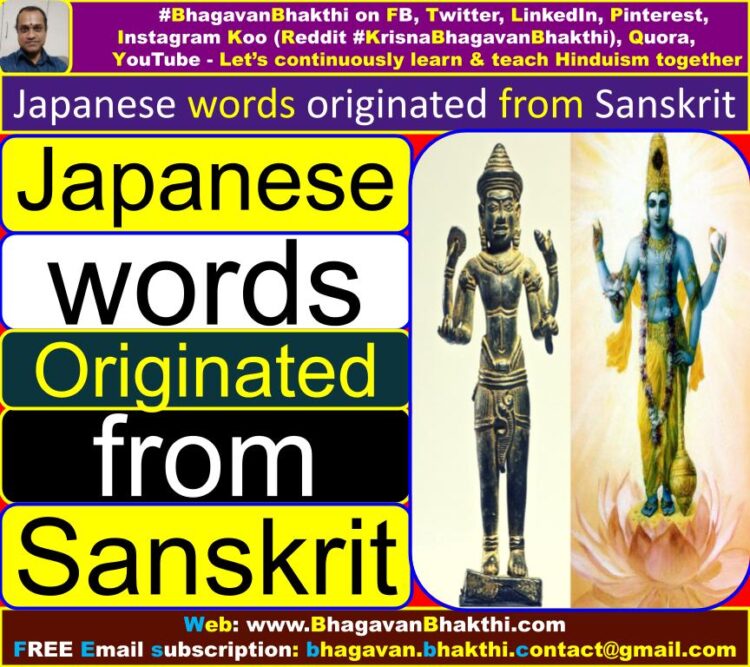
Today let us learn a very special and unknown knowledge of Indian Sanskrit language and Japanese relationship.
It has always excited me to know that all the languages around the world are nothing but Samskruta / Sanskrit words.
It may not be easy for many people to understand / accept this.
But we should always remember that Sanskrit language is the oldest bhasha / language on earth. No one knows when this great language was started.
It is existing since the ‘adi kalam’ / unknown age.
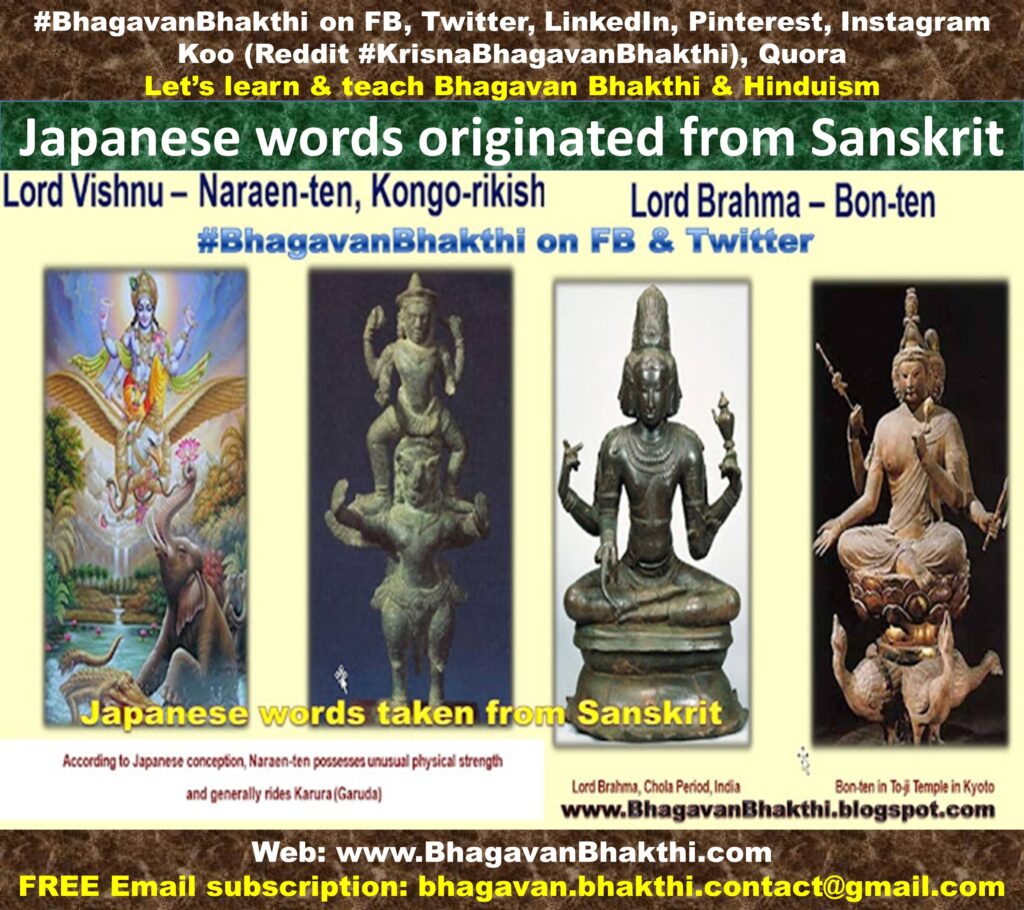
Many of us know that Sri Vishnu Deva / Dev is also known as Narayana Dev.
The Japanese God is known as Naraen-Ten, that is, it is taken from Narayan Dev.
Here Narayan is pronounced as Naraen and Deva/Dev is pronounced as Ten.
Similarly we know Sri Brahma Deva/Dev in Hinduism. The Japanese God Bon-ten is mispronounced word from Brahma Dev.
India and Japan have always been working very closely since many many years and have been great friends since very long time with each other.
Thus, there should be some close relationship in the Japanese language which is been associated with the Samskruta / Sanskrit language.
Let us know the words which are originally Sanskrit words, but are been used by Japanese with little difference in the pronunciation:
Naraen-Ten: Japanese have a God names Naraen-Ten who always sits on a bird called Karura (Karura is similar to a huge eagle).
We all know Sri Vishnu Deva is also known as Sri Narayana Deva / Narayan Dev. Very clearly the Japanese God called Naraen-Ten is nothing but our Sri Narayan Dev.
He also another point to be noted is that instead of Deva / Dev, they are pronuncing as Ten. Only difference is the pronunciation and nothing else.
Karura: As seen above, the Japanese’s God Naraen-Ten sits on a bird named Karura.
We know that Sri Vishnu / Sri Narayana also sits on the Sri Garuda Deva. Karura is very similar to Garuda.
Only difference is the pronunciation, that instead of Garuda, they are pronouncing as Karura.
Yakult: It is a product developed by Japanese to prevent liver and digestive organs.
In Samskruta / Sanskrit ‘yakrut’ means liver. Very clearly we can understand that Samskruta / Sanskrit bhasha is everywhere.
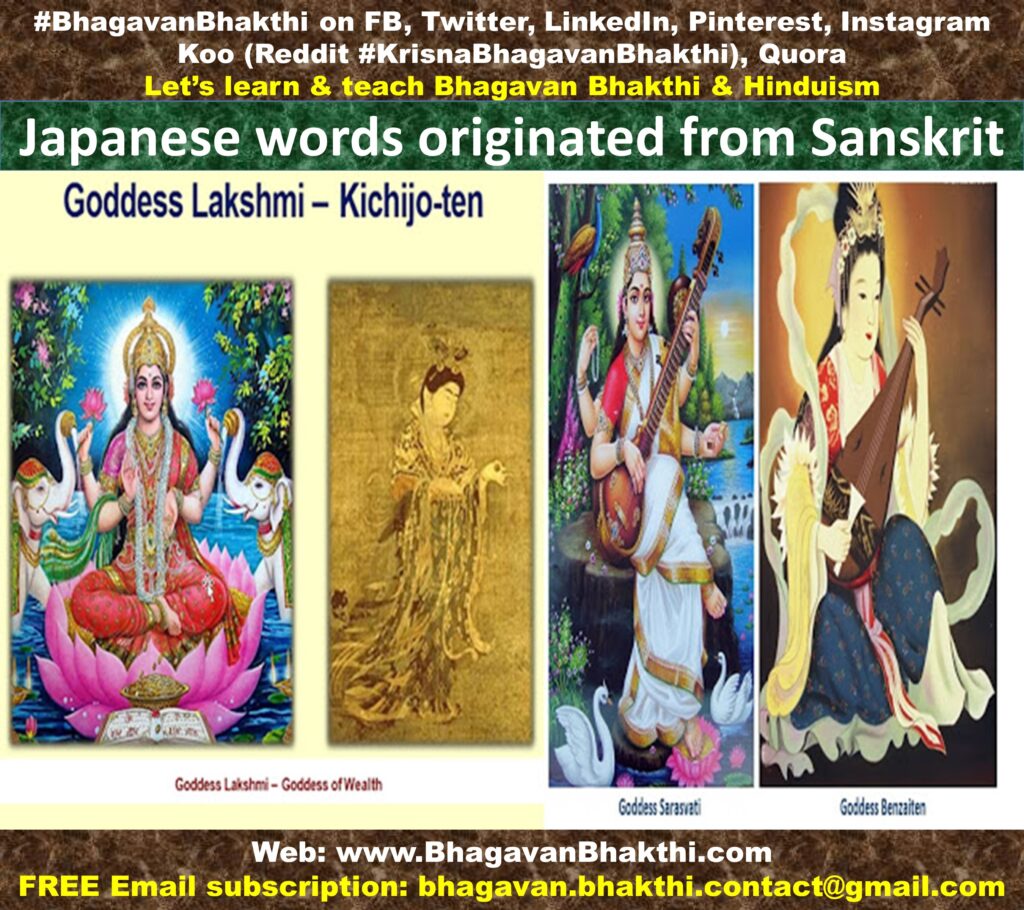
Sri Maha Lakshmi Devi in Japanese is known as Kichijo Ten and Sri Saraswati Devi is known as Benzaiten.
Katto: Katto (Japanese): In Japanese, this means cut. In Samskruta / Sanskrit, cut means ‘kartati or kartita’. Very clearly this Japanese words is a mispronounced word of the Sanskrit word.
Even in Hindi we pronounce it as ‘Kaato’, in Kannada we pronounce it was ‘kattarisu’ etc.
Bon-Ten: See the above image. We all know that, we have a God named Sri Brahma Deva or Sri Brahm Dev.
God Bon-Ten looks very similar to Sri Brahma Deva / Sri Brahm Dev. Instead of Brahma / Brahm, Japanese pronounce as Bon and instead of Deva / Dev, Japanese pronounce as Ten.
Also we should note that Hindu God Sri Brahma has a vehicle which is similar to a crane.
And here Japanese God (please carefully watch the above image), is riding on a bird which looks similar to a crane.
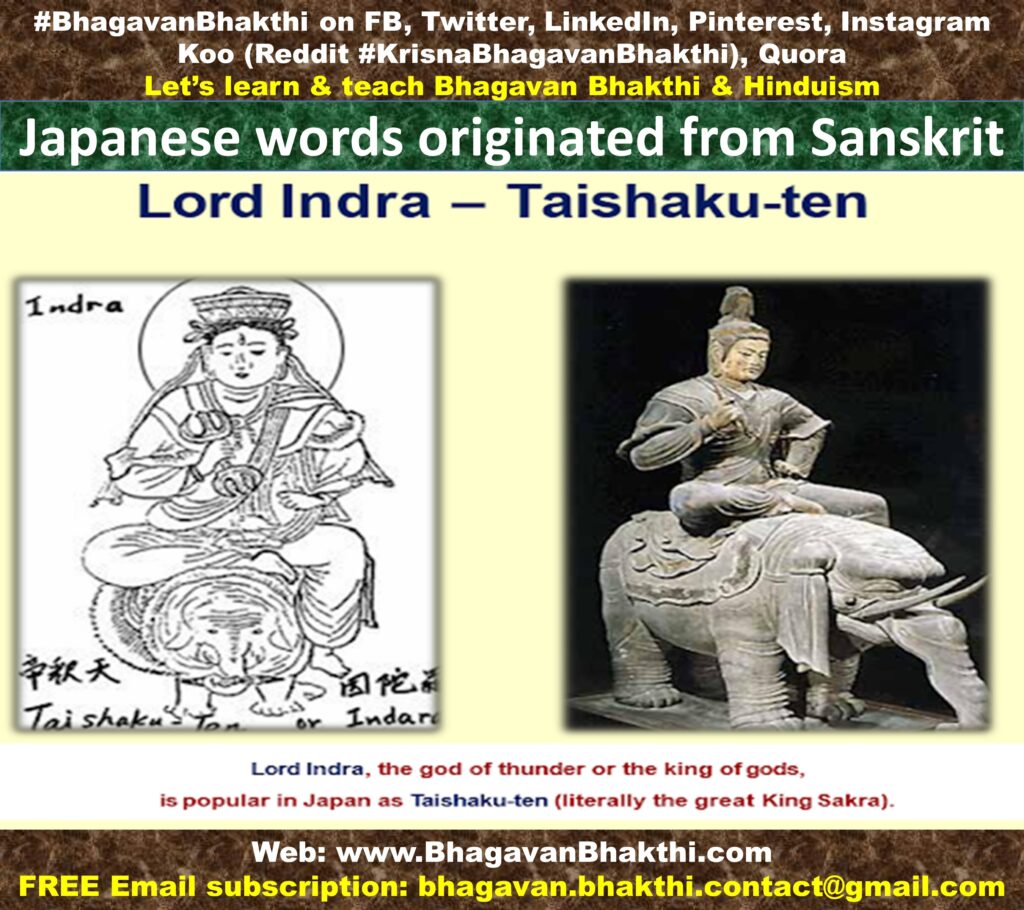
We all know Lord Indra rides on the elephant named Airavata (Iravat).
So does the Japanese God Taishaku Ten (Also known as Sakra – Indra – Mispronunciation) as seen in the image.
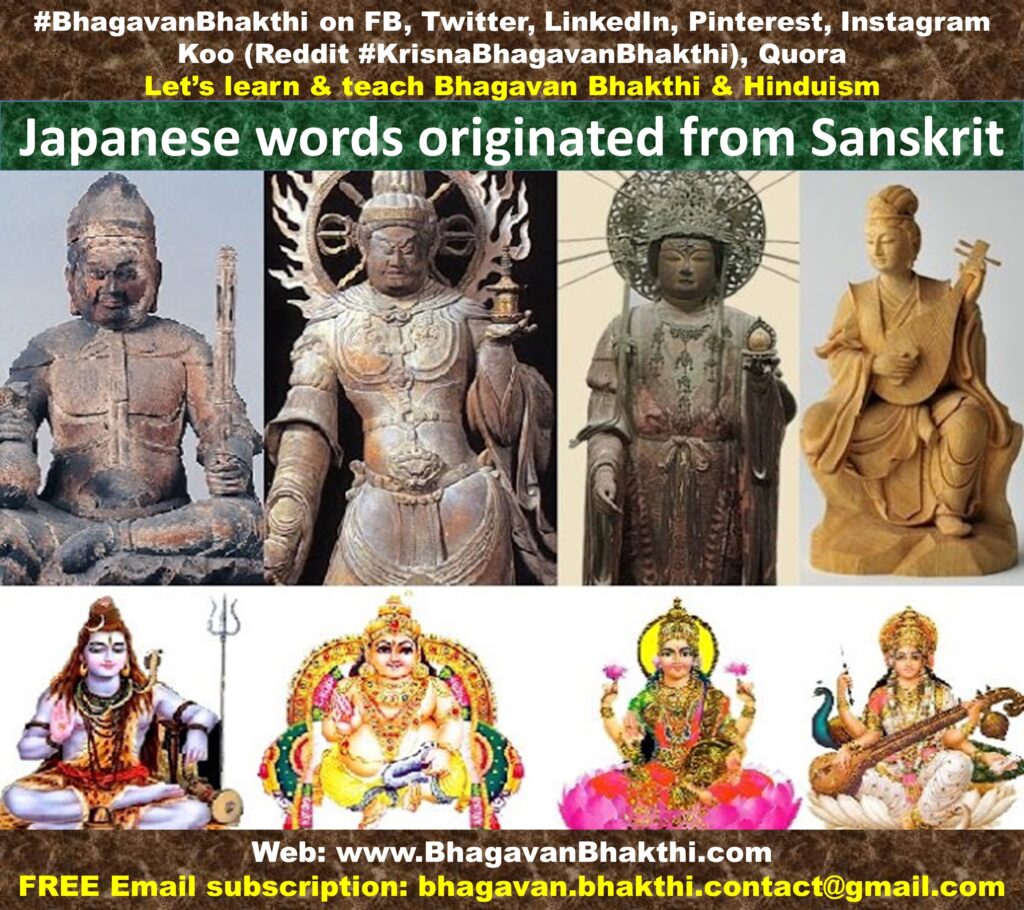
In the above image we can see lots of similarity. Lord Shiva holds a Trishul / Trident, so does the Japanese God. A statue similar to the Lord Kubera.
Also, a statue similar to Sri Mahalakshmi Devi.
Also, at the far end we see the similarity between the Hindu Goddess Sri Sarasvati Devi with the Japanese Goddess.
Both holding an instrument almost similar to each other (Sri Sarasvati Devi holds the instrument Veena).
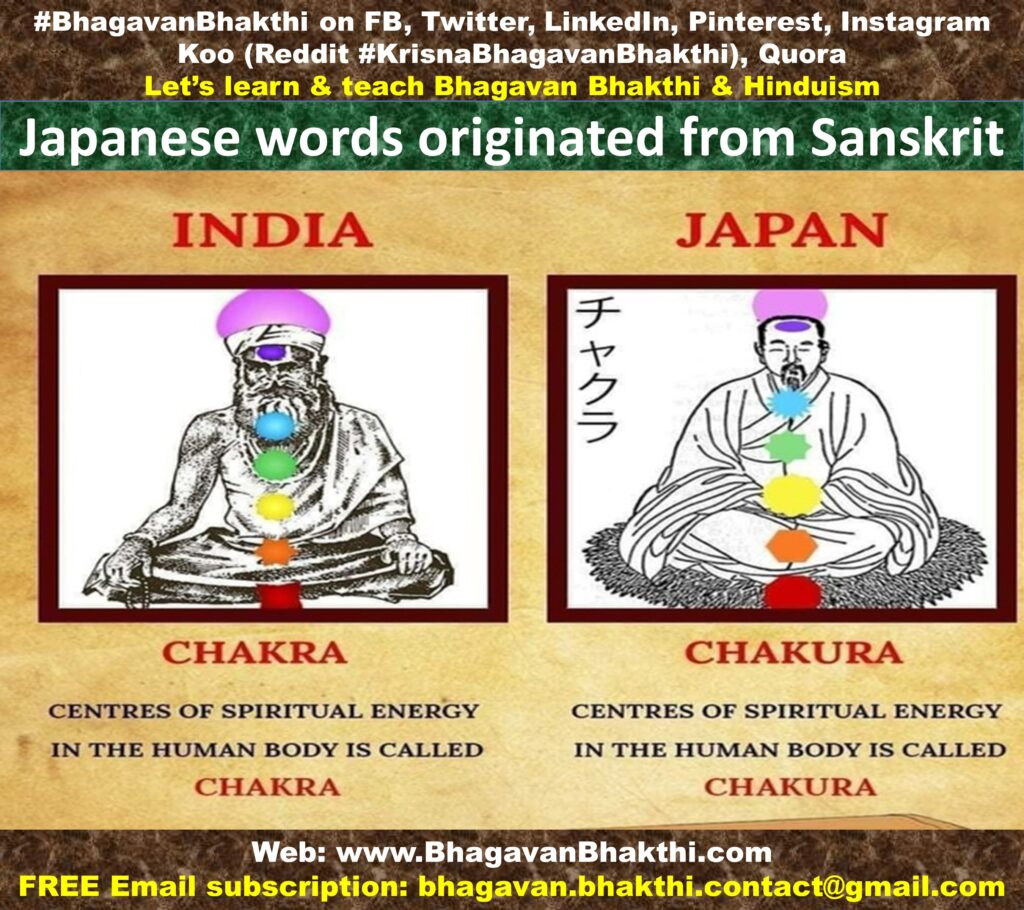
The above image is self explanatory.
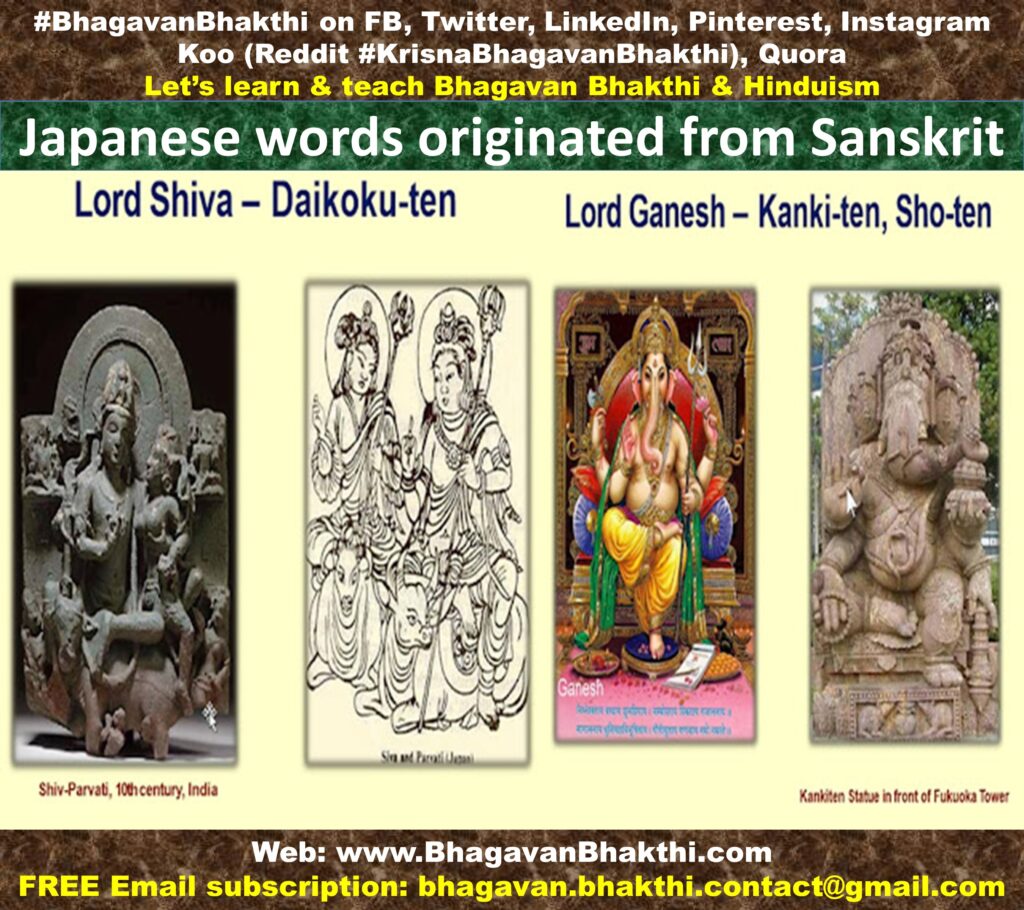
Lord Shiva in Japanese is known as Daikoku Ten. Lord Ganesha is known as Kank(g)i Ten.
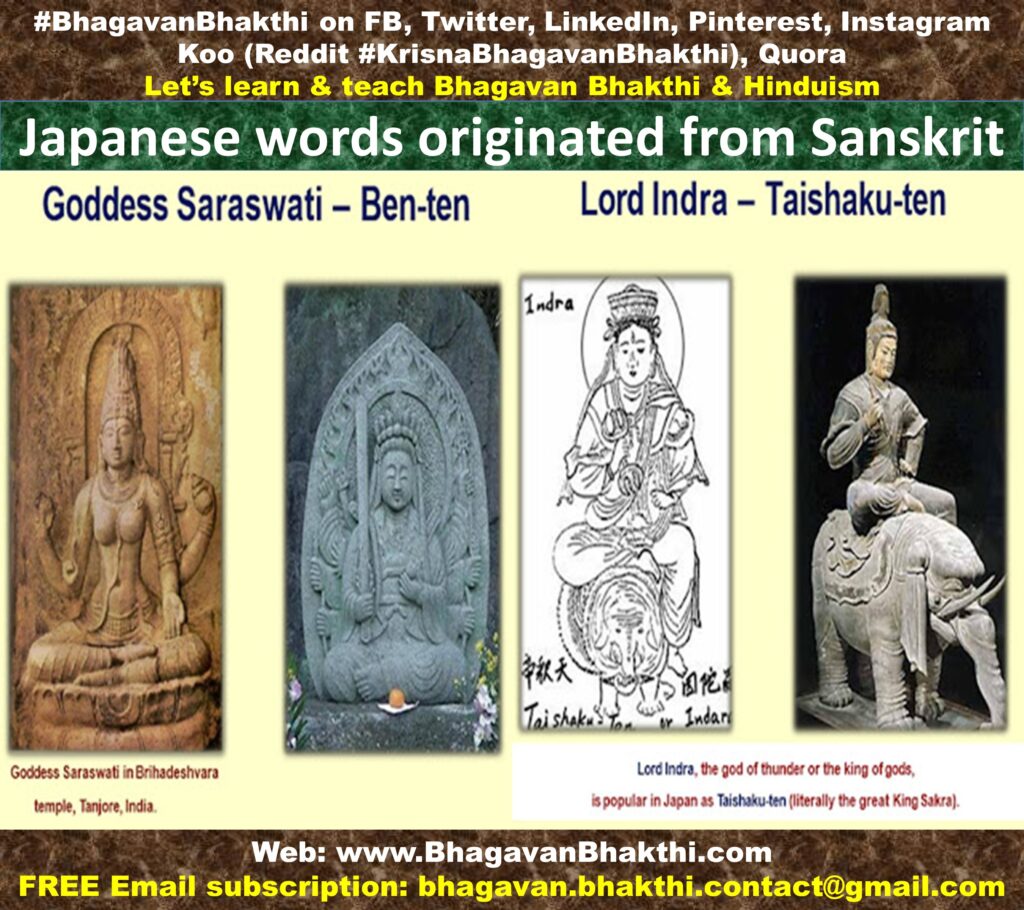
Sri Saraswati Devi in Japanese is known as Benzai Ten. Lord Indra is known as Taishaku Ten (Also known as Sakra – Indra – Mispronunciation) as seen in the image.
Now, let’s know more Japanese words which are originally Sanskrit words, but are derived / mispronounced / taken / edited etc from Sanskrit language:
Chakura (チャクラ): This word is same as Chakra. Both the Japanese and Hindu words are same and also has the same meaning.
There another word known as chakuramu (チャクラム), which also means chakram or simply chakra.
Naraku(奈落): This means hell in Japanese. Even in Sanskrit, hell means Naraka / Narak.
Mandara: This means something which are in group. Similarly we have a word called ‘mandala / madal’ in Sanskrit, which has the similar meaning.
Omu (オーム): This means Om in Japanese. In Sanskrit it is called as ‘Om’.
Kaama (カーマ): This means sex or something we expect or want. In Sanskrit it is called with the similar word “kama”.
Namae (名前): This means name is Japanese. This is nothing but the word taken from the Sanskrit word ‘naama / naam’. Even the English word is from Sanskrit.
Shanpu (シャンプー): Here word means Shampoo. The word is mispronounced from the Sanskrit word ‘Champoo’. Even the English word is from Sanskrit.
Shuga (シュガー): Here this sugar. This is very similar to the Sanskrit word ‘sakkara’. Even the English word is from Sanskrit.
Mausu (マウス): This means mouse in Japanese. This is taken from ‘mooshaka / mooshak’ from Sanskrit. Even the English word is from Sanskrit.
Orenji (オレンジ): Meaning is Orange. This is taken from the Sanskrit word ‘narangi. Even the English word is from Sanskrit.
Sandaru (サンダル): This means Sandal. This is taken from Sanskrit word ‘chandana’. Even the English word is from Sanskrit.
Doa (ドア): This means door in Japanese. This is from ‘dvara / dvar’ from Sanskrit. Even the English word is from Sanskrit.
Pedaru (ペダル): This means pedal or path. This is from Sanskrit word ‘paada / paad / patha / path’.
In Hindi also it is known as ‘paad or pair (means leg). Even the English is from Sanskrit.
Boisu (ボイス): This means voice. Here instead of ‘va’, Japanese are using ‘ba’. In Sanskrit this has word called ‘vachas / vaak’. Even the English word is from Sanskrit.
Kusa (草): This is called grass in Japanese. In Sanskrit grass has many words like ‘graasa, kusha’ etc. Even the English word is from Sanskrit.
Toraidento (トライデント): This means Trident. In Sanskrit this a word called as ‘trishul’.
Anburoshia (アンブロシア): This means ambrosia. In Sanskrit this is known as ‘amruta.
Puraimu (プライム): This means prime. In Sanskrit this has a word called pramukham / pramukha / pramukh.
Kotēji (コテージ): This means cottage. In Sanskrit it is known as Kuteeram / Kuteera / Kuteer.
Bīto (ビート): This means beat. In Sanskrit is it known as ‘peeto’ (same is used in Hindi too).
Sherutā (シェルター): This means ‘I take shelter with God’. In Sanskrit is it known as Sharana / Sharan.
Gyakusatsu (虐殺): This means Genocide. In Sanskrit it is known as ‘janahatya’.
Majikku (マジック): This means magic. In Sanskrit it known as ‘maaya’.
Sēji (セージ): This means sage. Sanskrit word is ‘sadhu’.
Sābanto (サーバント): This means ‘servent’. Sanskrit word is ‘sevakam’.
Saikō (最高): This means supreme. Sanskrit word is ‘sarvottama / sarvottam’.
Mirāju (ミラージュ): This means mirage. This is called as ‘maaya’.
Maindo (マインド): This means mind. This is called as ‘manaha’ or ‘manas’ in Sanskrit.
Appā (アッパー): This means upper in English. This is known as ‘upparitana’ in Sanskrit. In Hindi we know it is known as ‘upar’.
Karasu (カラス): This means crow. In Sanskrit it is known as ‘kaaka or kaak’.
Bijon (ビジョン): This means vision. Sanskrit has the word ‘vikshanam / vikshan’. It should be noted that in Japanese, they use ‘ba’ instead of ‘va’ in many places.
Daitan (大胆): This means daring. In Sanskrit it means ‘dhairyam or dhairya’.
Seisho (聖書): This means scripture. Sanskrit has the word known as ‘shruti or shloka’.
Pēji (ページ): This means page. In Sanskrit it is known as ‘patram or puta’.
Buru (ブル): This means bull. Sanskrit has the word called as ‘ballvardam or ballvarda’.
Kōnā (コーナー): This means corner. In Sanskrit it means ‘konam or kona’.
Kyūpiddo (キューピッド): This means cupid. Sanskrit word is ‘kaama’.
Adamu (アダム): This means adam. Sanskrit word is Adityam / Aadi.
Shakai (社会): This means society. Sanskrit word is ‘samajam / samaj’.
Sensā (センサー): This means sense / sensor. Sanskrit word is ‘sachetam or samvedaka’.
Monku (モンク): This means monk. Sanskrit word is ‘muni’.
Manmosu (マンモス): This means mammoth. Sanskrit word is ‘mahantaram / mahantara’.
Shokubutsu no shūto (植物のシュート): This means ‘shoot of a plant’. Here ‘shūto’ means shoot. Sanskrit word is ‘shiram / shira’.
Suimin (睡眠): This means sleep. Sanskrit word is ‘shayanam / shayan’.
Ūru (ウール) : This means wool. The Sanskrit word for wool is urna (ऊर्णा).
More information will be added to this on regular basis. Please visit this post and this blog / website to get the updated information.
To watch videos on #Hinduism #Sanskrit language, SUBSCRIBE to my YouTube channel from this below link:
#BhagavanBhakthi YouTube channel
It should be noted that even the English and all languages words are been taken from Sanskrit itself.
For more information you can visit these below links:
English words taken from Sanskrit Part 1
English words origin from Sanskrit Part 2
List of Arabic words originated from Sanskrit
Sanskrit history, facts, information, greatness, etc.
What is the relationship between Sanskrit and other languages
Dear friends, if you need any clarifications about this post, kindly let me know, I will definitely try to answer all of them.
Also your one LIKE, one COMMENT, One Share, one SUBSCRIPTION is highly important.
This will help to know the quality of this content and also it will be helpful to know if any improvements is required for the content.
If you feel this content is useful to you and has helped you to improve your knowledge, kindly share this with your well-wishers.
Because “SHARING MEANS CARING”.
For receive FREE EMAIL SUBSCRIPTION about #BhagavanBhakthi, you can send an email to [email protected] from your email ID.
NAMASTE!
Sri Gurubhyo Namaha
Sri Krishnaaya Namaha
Sri Krishnaarpanamastu